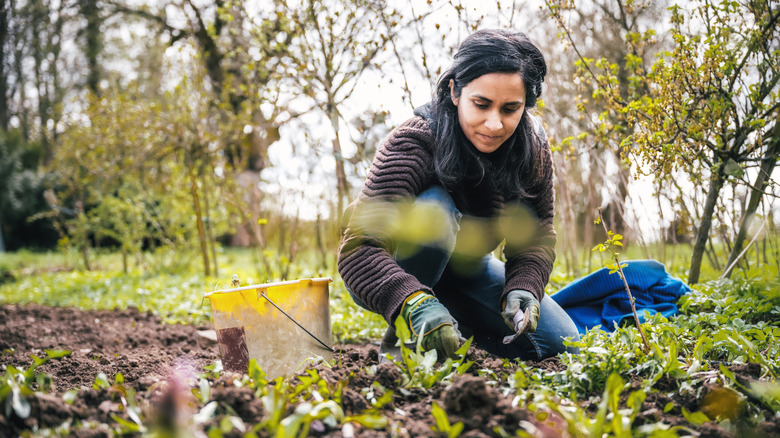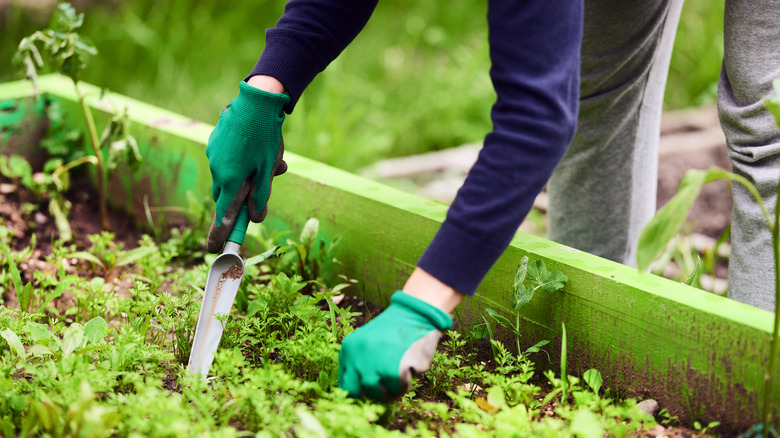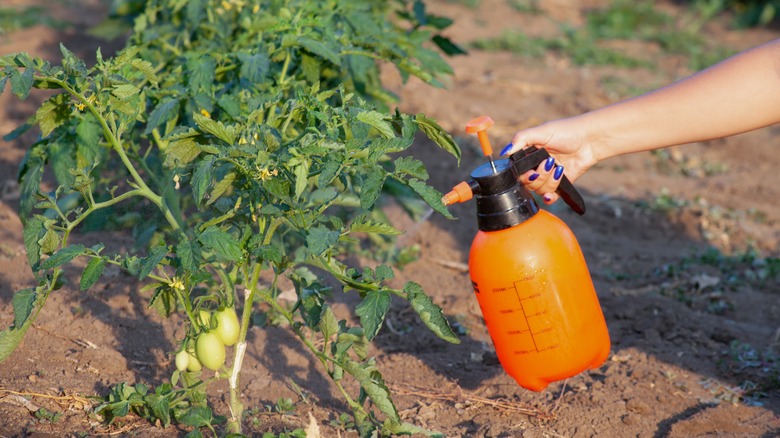Control Your Garden's Weed Problem With Dish Soap
Weeds are an unfortunate and inevitable aspect of gardening. After all, gardening is about growing things, and weeds have just as much of a right to grow as roses and tomatoes. But it would be great if there was an easy way to eliminate them. If pulling weeds is starting to wear on you, and you're opposed to using toxic weed killers, there are some effective and less harmful options for weed control. One of them lives right in your kitchen: ordinary dish soap. Then add two other household staples, vinegar and salt — one teaspoon of soap to one cup of salt and one gallon of white vinegar. This quick, cheap recipe gives you a solution that will work to kill and deter weeds in your vegetable garden.
Like most cleaning products, dish soap is made with chemicals. Dish soap is technically not soap; it is a detergent. This means it's not completely harmless to use on plants, so it's better to use it as a weed deterrent than a "natural" insecticide or fungicide applied directly to plants. You can pour the mixture into a spray bottle or an empty gallon milk jug. The sticky texture of dish soap gives it staying power, making it a good vehicle for less powerful ingredients like salt and vinegar.
The best way to use dish soap to control weeds
The easiest way to use a dish soap mixture to control weeds in your vegetable garden is to spray them when they're tiny. Once they grow large, you would need more spray to kill them, which means more soap, salt, and vinegar in the soil, which might affect the vegetables you want to grow. Some stubborn weeds have strong tap roots, such as dandelions, and the best way to get rid of these is to dig them out by the roots.
If your weeds have gotten a few inches tall, try cutting them down before applying the soap-salt-vinegar solution. This allows the ingredients to go right to the problem: the roots. Apply directly on the cut stem and around the roots of the weeds. Spraying alone may not work on all weeds, so you may have to dig them out if they return. Using this mixture sparingly is also important; avoid getting it on your edible plants.
You can also apply soap spray to the soil's surface after digging out weeds to prevent more of them from growing. If you can see small thread-like strands in the soil, these mean more roots of weeds are beginning to grow. It's also good to do this after raining or watering, not before, so it won't be diluted before it has a chance to work.
Where not to use dish soap in the garden
In addition to managing weeds, dish soap is sometimes used for other garden solutions. It is commonly added to DIY pest-control preparations, such as those used to control spider mites and aphids. It works to repel insects by leaving a thin film on the leaves that many bugs don't like to taste or smell. But do this sparingly, as dish soap shouldn't be on your vegetables; plants can absorb the harmful chemicals.
Some gardeners misinform that dish soap is nontoxic enough for garden use, i.e., safe to put on your food crops — but it's not. There are non-toxic pesticides and fungicides like neem oil (made from plants) that you can use. These will be less likely to affect your food crops than using detergents.
But dish soap can still be an effective way to deal with weeds, and certainly safer to use than many of the potent pesticide and herbicide products on the market. But let's reiterate — use this dish soap mixture sparingly, and don't apply it directly to your edible food crops.


